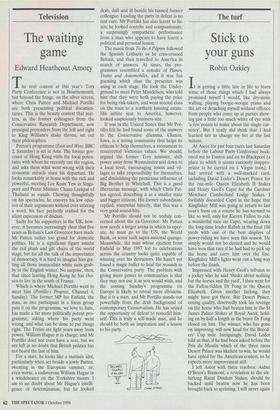Television
The waiting game
Edward Heathcoat Amory
The real contest at this year's Tory Party Conference is not in Bournemouth, but beyond the fringe, on the silver screen, where Chris Patten and Michael Portillo are both presenting political documen- taries. This is the beauty contest that mat- ters, as the former colleagues from the Conservative Research Department, now principal pretenders from the left and right to King William's shaky throne, set out their philosophies.
Patten's programme (East and West, BBC 2, Saturday) is set in Asia. The former gov- ernor of Hong Kong visits the local poten- tates with whom he recently ran the region, and asks them what went wrong with their economic miracle since his departure. He looks remarkably at home with the rich and powerful, meeting Lee Kuan Yew in Singa- pore and Prime Minister Chuan Leekpai of Thailand as equals. Chewing thoughtfully on his spectacles, he conveys his low opin- ion of their arguments without ever uttering a word, his face perfectly crafted for the silent expression of disdain.
Sadly for his supporters in the UK, how- ever, it becomes increasingly clear that five years as Britain's Last Governor have made Mr Patten rather too grand for domestic politics. He is a significant figure amidst the red plush and gilt chairs of the world stage, but for all the talk of the importance of democracy, it is hard to imagine him get- ting all those immaculate white suits grub- by in the English winter. No surprise, then, that since leaving Hong Kong he has cho- sen to live in the south of France.
Which is where Michael Portillo went to meet him (Portillo's Progress, Channel 4, Sunday). The former MP for Enfield, the man, as one participant in a focus group puts it on the programme, we love to hate, has made a far more politically potent pro- gramme, asking where his party went wrong, and what can be done to put things right. The Tories are light years away from power, William Hague is in charge, and Mr Portillo does not even have a seat, but we are left in no doubt that British politics has not heard the last of him.
For a start, he looks like a matinee idol, particularly when set beside a jowly Patten, sweating in the European summer, or, even worse, a cadaverous William Hague in a windcheater on the Yorkshire moors. I am in no doubt about Mr Hague's intelli- gence or determination, but he looked drab, dull and ill beside his tanned former colleague. Leading the party in defeat is no rest cure. Mr Portillo has also learnt to lis- ten; he looked contrite and compassionate, a surprisingly sympathetic performance from a man who appears to have learnt a political and personal lesson.
The music from To Be A Pilgrim followed the Spanish Lothario as he criss-crossed Britain, and then travelled to America in search of answers. At times, the pro- grammes resembled a remake of Planes, Trains and Automobiles, and it was fun guessing which class the presenter was using at each stage. He took the Under- ground to meet Peter Mandelson, who told him that they were both paying the price for being risk-takers, and went second class on the train to a northern housing estate. His airline seat to America, however, looked suspiciously business-size.
It was in the United States that Mr Por- tillo felt he had found some of the answers to the Conservative dilemma. Clinton, Iowa, is a strong community that helps its citizens to help themselves, a monument to resurrected Victorian values. We should, argued the former Tory minister, shift power away from Westminster and down to a local level, encouraging towns and vil- lages to take responsibility for themselves, and diminishing the pernicious influence of Big Brother in Whitehall. This is a good libertarian message, with which Chris Pat- ten agreed, describing it as a smaller state and bigger citizens. His former subordinate replied, somewhat bitterly, that this was a very good sound-bite.
Mr Portillo should not be unduly con- cerned about the ex-Governor. Mr Patten now needs a larger arena in which to oper- ate; he must go to the UN, the World Bank, or some such supra-national quango. Meanwhile, the man whose ejection from Enfield in May 1997 led to celebrations across the country looks quite capable of winning over his detractors. He hasn't yet found a magic bullet to heal the wounds in the Conservative party. The problem with giving more power to communities is that they may not use it as you would wish, and the coming Sunday's programme on Europe is likely to reveal more divisions. But it is a start, and Mr Portillo stands out powerfully from the drab background of contemporary Conservatism. He has seized the opportunity of defeat to remodel him- self. This is truly a self-made man, and he should be both an inspiration and a lesson to his party.










































































 Previous page
Previous page